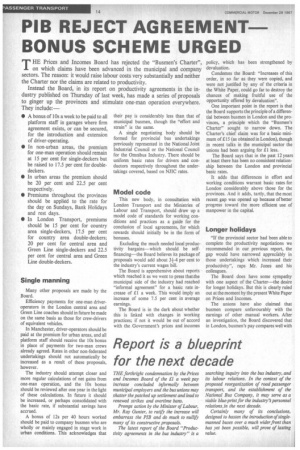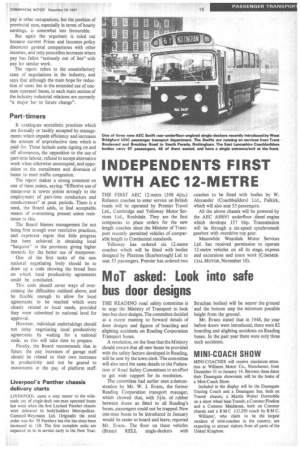PIB REJECT AGREEMENT BONUS SCHEME URGED
Page 16

Page 17

If you've noticed an error in this article please click here to report it so we can fix it.
THE Prices and Incomes Board has rejected the "Busmen's Charter", on which claims have been advanced in the municipal and company sectors. The reason: it would raise labour costs very substantially and neither the Charter nor the claims are related to productivity.
Instead the Board, in its report on productivity agreements in the industry published on Thursday of last week, has made a series of proposals to ginger up the provinces and stimulate one-man operation everywhere. They include:—
• A bonus of lOs a week to be paid to all platform staff in garages where firm agreement exists, or can be secured, for the introduction and extension of driver-operating.
• In non-urban areas, the premium for one-man operation should remain at 15 per cent for single-deckers but be raised to 17.5 per cent for doubledeckers.
• In urban areas the premium should be 20 per cent and 22.5 per cent respectively.
• Premiums throughout the provinces should be applied to the rate for the day on Sundays, Bank Holidays and rest days.
• In London Transport, premiums should be 15 per cent for country area single-deckers, 17.5 per cent for country area double-deckers; 20 per cent for central area and Green Line single-deckers and 22.5 per cent for central area and Green Line double-deckers.
Single manning
Many other proposals are made by the Board.
Efficiency payments for one-man driveroperators in the London central area and Green Line coaches should in future be made on the same basis as those for crew-drivers of equivalent vehicles.
In Manchester, driver-operators should be paid at the premium for urban areas, and all platform staff should receive the lOs bonus in place of payments for two-man crews already agreed. Rates in other non-federated undertakings should not automatically be increased as a result of these proposals, however.
The industry should attempt closer and more regular calculations of net gains from one-man operation, and the lOs bonus should be reviewed after one year in the light of these calculations. In future it should be increased, or perhaps consolidated with the basic rate, if substantial savings have accrued.
A bonus of 12s per 40 hours worked should be paid to company busmen who are wholly or mainly engaged in stage work in urban conditions. This acknowledges that their pay is considerably less than that of municipal busmen, though the "effort and strain" is the same.
A single negotiating body should be formed for provincial bus undertakings previously represented in the National Joint Industrial Council or the National Council for the Omnibus Industry. There should be uniform basic rates for drivers and conductors respectively throughout the undertakings covered, based on N.TIC rates.
Model code
This new body, in consultation with London Transport and the Ministries of Labour and Transport, should draw up a model code of standards for working conditions and practices as a guide for the conclusion of local agreements, for which rewards should initially be in the form of bonuses.
Excluding the much needed local productivity bargains—which should be selffinancing—the Board believes its package of proposals would add about 31-4 per cent to the industry's current wages bill.
The Board is apprehensive about reports which reached it as we went to press thatthe municipal side of the industry had reached "informal agreement" for a basic rate increase of £1 a week. This would imply an increase of some 7.5 per cent in average earnings.
The Board is in the dark about whether this is linked with changes in working practices; if not it would be out of accord with the Government's prices and incomes policy, which has been strengthened by devaluation.
Condemns the Board: "Increases of this order, in so far as they were copied, and were not justified by any of the criteria in the White Paper, could go far to destroy the chances of making fruitful use of the opportunity offered by devaluation".
One important point in the report is that the Board supports the principle of a differential between busmen in London and the provinces, a principle which the "Busmen's Charter" sought to narrow down. The Charter's chief claim was for a basic minimum of £15 (as obtained in London), though in recent talks in the municipal sector the unions had been arguing for £1 less.
The Board says that in the past 12 years at least there has been no consistent relationship between the London and provincial basic rates.
It adds that differences in effort and working conditions warrant basic rates for London considerably above those for the provinces. And it adds, tartly, that the most recent gap was opened up because of better progress toward the more efficient use of manpower in the capital.
Longer holidays
"If the provincial sector had been able to complete the productivity negotiations we recommended in our previous report, the gap would have narrowed appreciably in those undertakings which increased their productivity", raps Mr. Jones and his colleagues.
The Board does have some sympathy with one aspect of the Charter—the desire for longer holidays. But this is clearly ruled out at the moment by the present White Paper on Prices and Incomes.
The unions have also claimed that busmen compare unfavourably with the earnings of other manual workers. After an investigation, the Board discovered that in London, busmen's pay compares well with pay in other occupations, but the position of provincial men, especially in terms of hourly earnings, is somewhat less favourable.
But again the argument is ruled out because current Prices and Incomes policy discounts general comparisons with other incomes, and only prescribes increases where pay has fallen "seriously out of line" with pay for similar work.
The report refers to the unsatisfactory state of negotiations in the industry, and says that although the main hope for reduction of costs lies in the extended use of oneman operated buses, in each main section of the industry industrial relations are currently "a major bar to future change".
Part-timers
It catalogues unrealistic practices which are formally or tacitly accepted by managements which impede efficiency and increases the amount of unproductive time which is paid for. These include some signing on and off allowances, the opposition to the use of part-time labour, refusal to accept alternative work when otherwise unoccupied, and opposition to the curtailment and diversion of buses to meet traffic congestion.
The report makes a strong comment on one of these points, saying: "Effective use of manpower in towns points strongly to the employment of part-time conductors and conductresses" at peak periods. There is a need, the Board adds, to find acceptable means of overcoming present union resistance to this.
The Board blames management for not being firm enough over restrictive practices, and expresses regret that little progress has been achieved in obtaining local "bargains" in the provinces giving higher rewards for the better use of manpower.
One of the first tasks of the new national negotiating body should be to draw up a code showing the broad lines on which local productivity agreements could be concluded.
This code should cover ways of overcoming the difficulties outlined above, and be flexible enough to allow for local agreements to be reached which• were closely related to local needs, provided they were submitted to national level for approval.
However, individual undertakings should not delay negotiating local productivity agreements by waiting for a national code, as this will take time to prepare.
Finally, the Board recommends that in future the pay increases of garage staff should be related to their own increases in productivity and not be geared to movements in the pay of platform staff.
Liverpool's Panther chassis delivery starts
LIVERPOOL came a step nearer to the widescale use of single-deck one-man operated buses last week when the first Leyland Panther chassis were delivered to bodybuilders MetropolitanCammell-Weymann Ltd. Originally the total order was for 70 Panthers but this has since been increased to 110. The first complete units are expected to be in service early in the New Year.












































































